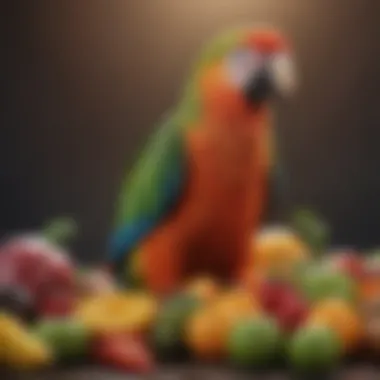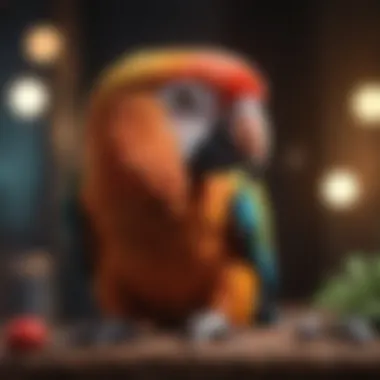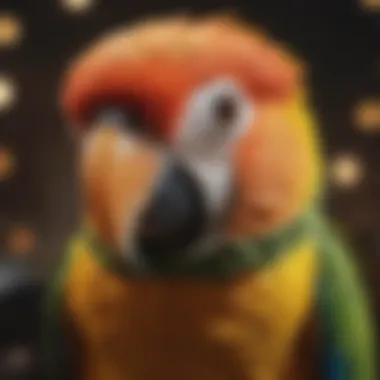Understanding Parrot Vitamins for Optimal Avian Health


Intro
Providing proper care for pet birds entails understanding their needs, especially regarding nutrition. Parrots, like many other avian species, benefit significantly from a well-thought-out diet that includes essential vitamins. This article examines the vitamins vital for the health of parrots, their unique dietary needs, and the implications of any deficiencies. Furthermore, it explores effective methods of integrating essential vitamins into a parrot's diet through food choices and supplements. This comprehensive look contrasts modern practices with traditional methods of avian care, aiming to enhance the well-being of feathered companions.
Avian Care Basics
Importance of Proper Nutrition
Proper nutrition is the cornerstone of health for parrots. These birds are not only intelligent but also come from various habitats with specific dietary requirements. A diet rich in essential vitamins helps maintain their immune systems, supports growth, and promotes overall well-being. Inadequate feeding can lead to numerous health problems including feather plucking, lethargy, and in severe cases, death.
Understanding Bird Species and Their Needs
Not all parrots are the same, and their nutritional needs can vary. Macaws, for example, have different requirements from budgerigars or cockatiels. Knowledge about the specific species informs appropriate dietary choices, ensuring pet owners provide the right balance of vitamins and minerals tailored to their bird's needs.
Basics of Birds Habitat Setup
Creating a conducive environment is more than about providing food and vitamin supplements. A comfortable and engaging habitat must include adequate space for flying and playing. An enriched habitat encourages natural behaviors, indirectly contributing to their nutritional health by promoting activity. Often, an active bird is a healthier bird.
Grooming and Hygiene Tips
A bird's outward health reflects its internal condition. Regular grooming and proper hygiene can prevent the spread of diseases. As important as feeding, maintaining cleanliness in bird cages and ensuring that the feathers are kept clean will help meet their basic health requirements. Appropriate bathing, nail trimming, and beak care are elements that should not be overlooked.
Culmination
In summary, understanding the importance of vitamins in a parrot's diet reveals fundamental insights into creating a happier, healthier pet. Care involving love, knowledge, and endeavor can lead to well-read lives for both parrots and their owners.
The Importance of Vitamins in Parrot Care
Appropriate nutrition is fundamental for the health and vitality of parrots. Vitamins play a pivotal role in supporting their physiological functions and maintaining overall well-being. A well-balanced diet enriched with essential vitamins not only promotes longevity but also enhances quality of life for these intelligent birds.
In parrot care, it is crucial to recognize the specific roles vitamins play. Each vitamin contributes to various bodily functions. For instance, Vitamin A is critical for ensuring proper vision and skin health, while Vitamin D aids in calcium absorption, necessary for strong bones and feathers.
Deficiencies in these vitamins can lead to severe health complications, making it imperative to ensure that a parrot's diet incorporates adequate amounts of these essential nutrients. Providing the right balance of vitamins should never be an afterthought; rather, it should be a foundational component of care for pet birds.
Understanding Nutritional Requirements
Parrots have specific nutritional needs that include a spectrum of vitamins. These requirements vary not only among different species but also depending on the age and health condition of the bird. Understanding these nutrient requirements is crucial for any parrot owner.
Nutritional needs can generally be categorized into macronutrients and micronutrients. While macronutrients include proteins, fats, and carbohydrates, vitamins fall into the micronutrient category. They might be needed in smaller amounts, but their impact on health is substantial.
Bird owners should examine the available food options carefully to ensure these needs are met. These foods often come from fruits, vegetables, seeds, nuts, and specially formulated pellets. Like humans, parrots cannot synthesize vitamins on their own, making their intake entirely dependent on their diet.
Role of Vitamins in Bird Physiology
Vitamins serve essential roles in the physiology of parrots. Each vitamin operates differently and influences various biological systems.
- Vitamin A: Crucial for vision and immune protection, it aids the health of epithelial tissues, including skin.
- Vitamin D: This vitamin is vital for regulating calcium levels within the body. It supports bone health and enables normal muscle function.
- Vitamin E: Functions as a strong antioxidant, protect them from free radicals, supporting immune function and skin health.
- B-Complex vitamins: These vitamins handle multiple roles in energy metabolism and mental function support. Consider monitoring levels of Thiamine and Riboflavin for optimal energy processes.
In summary, vitamins underpin fundamental health processes and are critical for the overall vitality of parrots. Ensuring their diets are appropriately rich in these nutrients is a responsibility that pet owners need to manage with laser focus.
Essential Vitamins for Parrots
Understanding essential vitamins for parrots is critical for maintaining their health and vitality. Just like humans and other animals, parrots require a balanced intake of vitamins to support various bodily functions. Vitamins serve as biochemical catalysts, enabling the processing of nutrients, fostering growth, and helping to prevent diseases. A deficiency in these necessary vitamins can lead to nutritional imbalances, causing severe health problems for parrots.
In this section, we specifically analyze several vital vitamins necessary for parrot health. Each vitamin has distinct roles and benefits. Knowing these can help bird owners provide better care requirements suitable for their feathered companions, offering a balanced diet, either through food or supplements.


Vitamin A: Crucial for Vision and Skin Health
Vitamin A plays a significant role in coloor vision, skin maintenance, and immune function among parrots. This vitamin helps produce the pigments in the retina, supporting good vision. Deficiency can lead to night blindness and compromised immune system performance. For skin health, vitamin A is crucial in promoting cells renewal and preventing issues such as feather loss.
Rich food sources of vitamin A include carrots, sweet potatoes, orange bell peppers, and dark leafy greens. Parrot owners should consider incorporating these items into their pets' diets.
Vitamin D: Importance for Calcium Absorption
Vitamin D is essential in facilitating calcium absorption. Parrots need calcium for strong bones and to maintain healthy feather production. Without sufficient vitamin D, calcium cannot be utilized effectively, which can lead to disorders related to bone and feather stresses, like metabolic bone disease.
Exposure to natural sunlight remains one of the most effective ways for parrots to obtain vitamin D. However, not all bird owners can provide this natural exposure, making it essential to source vitamin D from fortified pellete or supplements designed for parrots. Foods like eggs and fish liver oils are also rich in vitamin D.
Vitamin E: Antioxidant and Immune Function
Vitamin E serves as a vital antioxidant, fighting free radicals in the body. These free radicals can cause cellular damage over time, leading to various health issues. Regular intake of vitamin E can help to sustain a parrot’s immune system, reducing disturbed immunity, diseases and even prolonging lifespan.
Parrots can acquire vitamin E from sources like nuts, seeds, and green leafy vegetables. Therefore, ensuring an adequate level of vitamin E in your parrot's diet is crucial for maintaining overall health and well-being.
B-Complex Vitamins: Energy and Metabolism
B-complex vitamins include a group of eight vitamins that are crucial for energy production and metabolic support. They aid in the process of converting food into energy, particularly important for birds who forage and require high energy levels for routine activities like flying. Common B vitamins include B1 (thiamine), B2 (riboflavin), and B6 (pyridoxine).
Parrots will benefit from a variety of food sources for b-complex vitamins, such as whole grains, legumes, seeds and yeast-enriched pellets. Incorporating these options may help parrot owners ensure adequate levels of these vital nutrients in their bird's diets.
Attention: Regular monitoring of urls or supplementary nutrition intake may be beneficial to prevent deficiencies in specific vitamins, especially during controlled, dietary transitions in parrots.
Vitamin management is a vital element of avian health. Knowledge of the importance of each vitamin will significantly enhance pet bird owners' capabilities in ensuring adequate nutrition for their companions.
Sources of Parrot Vitamins
Understanding where parrots can obtain their vitamins is critical. A balanced diet combines natural food sources and commercial supplements. Each has unique benefits that contribute to avian health. Avian caregivers should be aware of how to integrate these sources effectively. This knowledge enhances the overall well-being of parrots.
Natural Food Sources
Natural foods are vitally important in providing the essential vitamins that parrots need. Three primary categories stand out: fruits and vegetables, seeds and nuts, and whole grains. Each category delivers specific nutritional value and should feature prominently in any feeding plan.
Fruits and Vegetables
Fruits and vegetables are cornerstone components of a parrot's diet. They offer a diversity of vitamins such as A, C, and K. Fresh fruits can help prevent dehydration and support immune function.
Fruits are typically high in antioxidants, while vegetables provide dietary fiber and essential minerals. For parrots, vibrant and colorful options like carrots and leafy greens remain a favored source. However, some fruits can be high in sugar, which is a disadvantage in higher quantities.
Seeds and Nuts
Seeds and nuts serve not only as tasty treats, they alsocontain essential fats necessary for energy. Sunflower seeds and almonds are examples that many parrots enjoy. These sources are beneficial overall because they contain omega-3 fatty acids that support skin and feather quality.
However, a disadvantage is their high-fat content, which necessitates moderation to prevent obesity. Balancing the proportion of seeds to other food types is key. A few seeds or nuts sprinkled in a diet work well.
Whole Grains
Whole grains furnish parrots with vital carbohydrates, aiding energy release. Foods like oats and brown rice act as healthy foundation for meals. Rich in B vitamins, whole grains help in metabolism and develop into an integral part of dietary plans.
While providing plentiful energy, it's essential not to rely solely on grains. Whole grains work best as a supplementary part of a parrot's overall balanced diet to prevent nutritional gaps.
Commercial Supplements
Complementing natural food sources with commercial supplements can be an effective strategy. They offered fortified nutrition where natural diets premium might be lacking. Various forms are available for convenience and handling ease such as powders, liquids, or pellets.


Vitamin Powders
Vitamin powders are concentrated forms that allow for easy application to foods. Blending them with fresh fruits or vegetables augments daily vitamin intake significantly. Ease of use and the ability to customize doses stands out as notable benefits.
Yet, lack of oversight can lead to over-supplementation. Proper guidance from an avian veterinarian is vital to avoid potential health issues that arise from improper use.
Liquid Supplements
Liquid supplements offer another avenue for parrot owners. They can be administered directly or added to drinking water for consistency. Avian enthusiasts regard liquid supplements as widely palatable.
Nonetheless, these rely on accurate measuring for each dosage to avoid overdosing risk. Educating oneself about the concentration of saying products remains essential.
Fortified Pellets
Fortified pellets stand as commercially produced options offering precisely formulated nutrients tailored for parrots. These represent convenient complete diets as they provide critical vitamins along with other dietary components.
However, raisins vary in quality, and not all commercial brands ensure balanced nutrition. Careful selection and occasional variety will help fulfill all essential requirements.Help continuous scouting for quality sources is suggested.
To ensure a simple and balanced approach, knowledge of both natural and commercial sources leads to better avian healthcare. Parrot wellbeing depends on correctly integrating all sources.
Understanding the sources of vitamins aids caregivers in building a nutritionally adequate diet. When natural foods are impossible or unavailable, knowing about commercial supplements gives a path forward toward meeting the dietary needs of parrots.
Recognizing Vitamin Deficiencies in Parrots
Vitamin deficiencies in parrots can lead to serious health issues and have long-term effects on their quality of life. Caregivers need to understand the implications of such deficiencies. It is essential for anyone involved in parrot care to recognize signs that their birds may not be receiving adequate nutrition. This promotes better decision making to enhance the overall health and happiness of these intelligent creatures. Identification and intervention can prevent minor issues from developing into major health complications.
Common Symptoms of Deficiency
It is crucial to watch for physical and behavioral changes in parrots, as these may signal a vitamin deficiency. Here are some common symptoms:
- Feather Issues: Poor feather condition, unusual molting, or feather plucking can indicate deficiencies, particularly in vitamins A and D.
- Changes in Appetite: A sudden decrease or increase in food intake may signal discomfort or illness related to deficiencies in nutrients.
- Lethargy: A lack of energy or motivation to socialize could suggest nutritional issues.
- Weight Loss: This can be a serious indicator of health issues and should be evaluated promptly.
- Respiratory Trouble: Difficulty breathing may arise from vitamin deficiencies affecting the immune system.
Understanding these symptoms helps in the early detection of potential health problems, allowing for timely veterinary intervention.
Health Issues Related to Deficiencies
Various health complications may arise from vitamin deficiencies, impacting a parrot's quality of life significantly. Key health issues include:
- Immunodeficiency: Lack of essential vitamins can weaken the immune system, making parrots more susceptible to infections.
- Metabolic Bone Disease: This can occur, especially due to vitamin D deficiency, leading to severe calcium metabolism issues, resulting in weaker bones.
- Vision Problems: Insufficient vitamin A can lead to various eye disturbances, affecting a parrot’s ability to navigate its environment.
- Reproductive Issues: A lack of certain vitamins may affect breeding and egg-laying health.
- Skin Conditions: Vitamins are essential for skin health; deficiencies can lead to irritations or infections.
Careful nutritional management is necessary to sustain avian health and to prevent these significant problems from developing. A well-rounded diet must include ample vitamins, and monitoring the parrot's condition is integral to ensuring they're thriving.
“A bird without vitamins is like a sailor without a map; you may still steer your course, but perilously and without real destination.”
By prioritzing nutrient intake, pet owners can greatly enhance their parrot's lifespan and see them flourish in health.
Implementing a Balanced Diet
Implementing a balanced diet for parrots is essential for their overall health and longevity. A nutritious diet not only meets their vitamin and mineral needs but also improves their well-being significantly. When considering diet for parrots, understanding nutrient balance is key. A balanced diet enhances the bird's immune function, promotes a healthy feather condition, and supports overall vitality.
Proper nutrition affects several physiological processes. Each parrot species may have different requirements based on their size, age, and activity level. Therefore, tailoring a diet is not just beneficial—it is necessary for addressing the unique needs of each parrot.
Creating a Nutrient-Rich Feeding Plan
Creating a nutrient-rich feeding plan is the foundation of ensuring avian health. A good feeding plan should include a variety of food sources to ensure that the bird gets all essential vitamins and minerals. Here are some considerations for constructing such a plan:
- Diverse Food Sources: Include fruits, vegetables, seeds, nuts, and commercial pellets. A mix helps avoid deficiencies in specific nutrients.
- Freshness is Critical: Always provide fresh food items. Vitamins lose potency when exposed to air and light over time.
- Monitor Portion Sizes: While it's tempting to offer variety, portion control is necessary to prevent obesity and ensure each meal is balanced.
- Understand Individual Preferences: Observe what your parrot enjoys most. While providing a balanced feeding plan is important, ensuring they eat is, too.


Vitamins discussed earlier form a crucial part of this feeding plan. For example, incorporating leafy green vegetables into the mix can supply Vitamin A, while fruits often provide Vitamin C and additional antioxidants. Some common choices include bell peppers, carrots, and dark leafy greens. Incorporating these will promote a diverse nutrient profile.j
Monitoring Diet and Health
Monitoring diet and health aspects is an ongoing process. Owners should familiarize themselves with their parrot’s eating habits. Changes, either in quantity or type of food, can indicate health issues. Regular check-ins regarding weight gain or loss can also signal problems related to diet.
It can be useful to keep a log of food intake over time. This allows for tracking of changes and trends in dietary habits and overall health indicators. Consider investing in a bird scale to measure weight accurately.
Backed by the nutritional needs, it helps to form a clearer picture of your parrot’s health status. That implementation can guide adjustments promptly if deficiencies or excesses are noted. Factors such as increased molting periods or changes in behavioral patterns may highlight the need for adjustment to their diet.
Birds are generally good at hiding issues. Regular observation and monitoring health patterns are key to maintaining their well-being.
By combining knowledge of vitamins along with varied feeding and continual monitoring, parrot owners can effectively implement a balanced diet that serves to enrich the quality of life for their avian companions.
Consulting with Avian Veterinarians
Consulting with avian veterinarians is a fundamental aspect of parrot care that should not be overlooked. These professionals provide specialized knowledge tailored to the unique health needs and concerns of birds. Given the complexities involved in avian nutrition, understanding how to integrate appropriate vitamins into a parrot's diet can be enhanced through veterinary guidance. The insights gained from these consultations can significantly elevate your capability to nurture your feathered friend.
When to Seek Professional Advice
Parrot owners should consider consulting with an avian veterinarian during various circumstances. If any signs of health issues are present, such as changes in behavior, feathering, or appetite, it’s time for a checkup. Moreover, before introducing any new dietary changes or supplements, professional advice is critical. An expert can assist in distinguishing between healthy dietary alterations and those that may inadvertently lead to nutrient imbalances.
Additionally, if a parrot has a known history of nutritional deficiencies or other health challenges, regular consultations become crucial in maintaining optimal health. Such discussions ensure that all decisions regarding diet or supplements are backed by current knowledge and tailored solutions.
Some common scenarios where advice should be sought include:
- Signs of lethargy or unusual behavior
- Changes in droppings or other bodily functions
- Visible signs of illness, such as poor feathering or skin irritations
- Dietary changes or incorporating new foods
- When preparing for breeding
Importance of Regular Health Checks
Regular health checks with an avian veterinarian serve substantial benefits for parrots. These evaluations help in tracking the overall health status and identify any issues before they escalate. Routine checkups allow for comprehensive assessments that can cover various aspects such as weight monitoring, plumage condition, and blood tests to evaluate vitamin levels among other essential health metrics.
Immunizations and preventive care are also typically part of these checkups. By maintaining a relationship with a veterinarian, owners can stay informed about necessary vaccinations and preventive treatments that protect their parrots against diseases.
Incorporating these visits into the regular care plan facilitates:
- Early detection of potential health concerns
- Guidance on ideal nutrition and supplementation
- Confidence in the parrot’s overall health status
- Development of a preventive health strategy that supports longevity
It is clear that consulting with avian veterinarians is vital for promoting a healthy life for parrots. The wisdom gained from such dedication ultimately allows pet owners to cultivate a supportive and nourishing environment for their birds.
Epilogue: Prioritizing Vitamin Nutrition in Parrots
Ensuring that a parrot receives adequate vitamins is crucial for its overall health and vitality. This conclusion emphasizes the role of vitamin nutrition as a cornerstone of effective parrot care. Without sufficient vitamins, parrots can face numerous health issues including, but not limited to, poor feather quality, impaired vision, and weakened immune responses. Vitamin deficiencies can have lasting effects, not only impacting the bird's physical state but also its behavioral aspects.
One of the major benefits of prioritizing vitamin nutrition is the enhancement of a parrot's quality of life. Healthy, well-nourished parrots exhibit greater energy levels and engage more with their environment. Additionally, vitamins facilitate developmental processes, advancements in metabolism, and physiological functions that are critical for avian health. Recognizing these aspects can empower parrot owners to create a more nurturing atmosphere for their feathered companions.
Moreover, understanding the complex interplay between various vitamins and a parrot's individual needs can guide owners in making informed dietary choices. Differences in species, age, and activity levels can influence nutritional requirements. Thus, consulting with avian specialists is important. They can provide tailored recommendations for vitamin supplementation and dietary adjustments.
The key takeaway is clear: acknowledging the significance of vitamin intake helps rebuild and sustain the avian body, promotes overall wellness, and fosters a caring relationship between parrots and their owners. At the heart of associateing with birds is the acumen that often both knowledge and prevention ensure a long and fulfilling life for these vibrant creatures.
Summarizing Key Takeaways
- Vitamins are essential for various physiological functions in parrots.
- Deficiencies can lead to severe health problems.
- A well-balanced diet can improve energy levels and life quality.
- Individual needs vary; consulting with professionals is advised.
- Educating oneself enables better care decisions for pet birds.
Encouraging Ongoing Education for Bird Owners
Educational resources about bird nutrition and health are plentiful and beneficial for owners serious about the welfare of their parrots. Books, online courses, and discussion boards are effective ways for bird owners to increase their understanding. Furthermore, paarticipation in online communities such as Reddit that focus on birds can yield insights from others' experiences.
Engaging in ongoing learning works towards building a strong foundation for bird care. Being aware of the newest research and practices in avian nutrition equips owners with the tools necessary for ensuring their buddies thrive in their environments. Regularly reading articles, xperiencing avian seminars, and meeting with veterinarians can enhance both knowledge and practice.
"A knowledgeable bird owner cultivates the best possible environment for their parrots."
Ultimately, prioritizing vitamin nutrition is not just about short-term results; it is about making long-lasting improvements that reflect the commitment to avian health and happiness. This mindful approach to caring for parrots can lead to fulfilling relationships, fostering trust, and enhancing overall well-being within this unique pet friendship.















